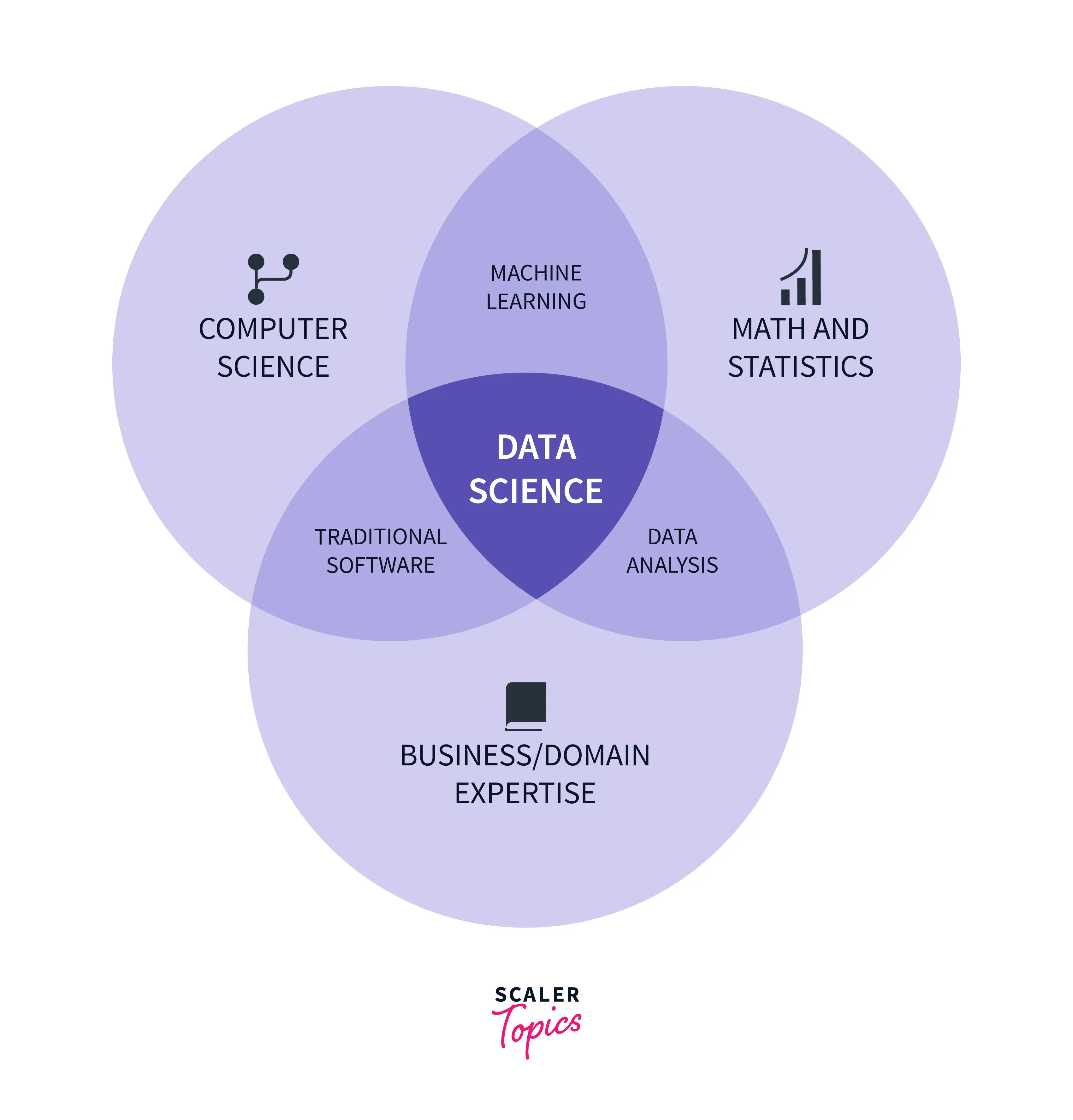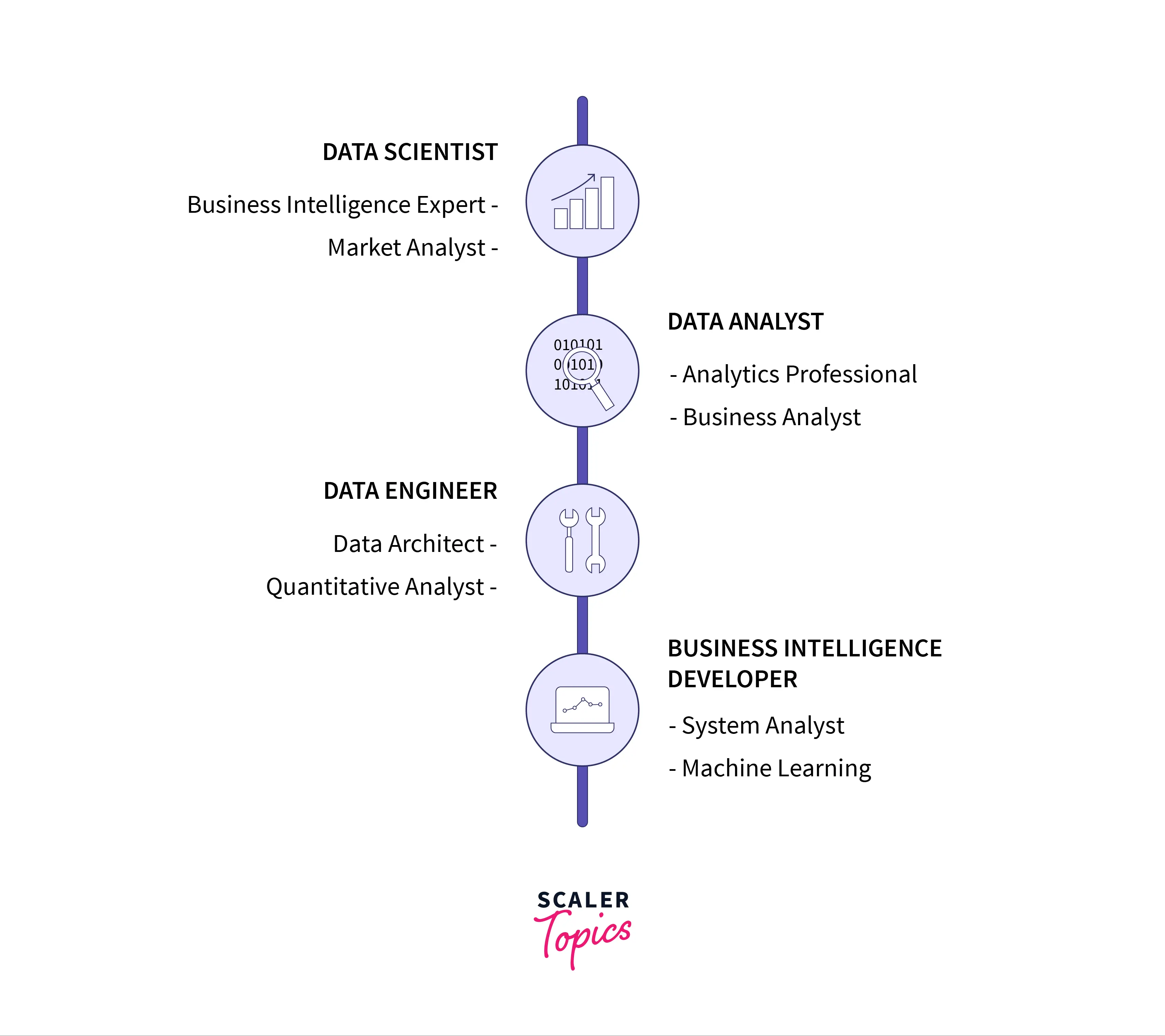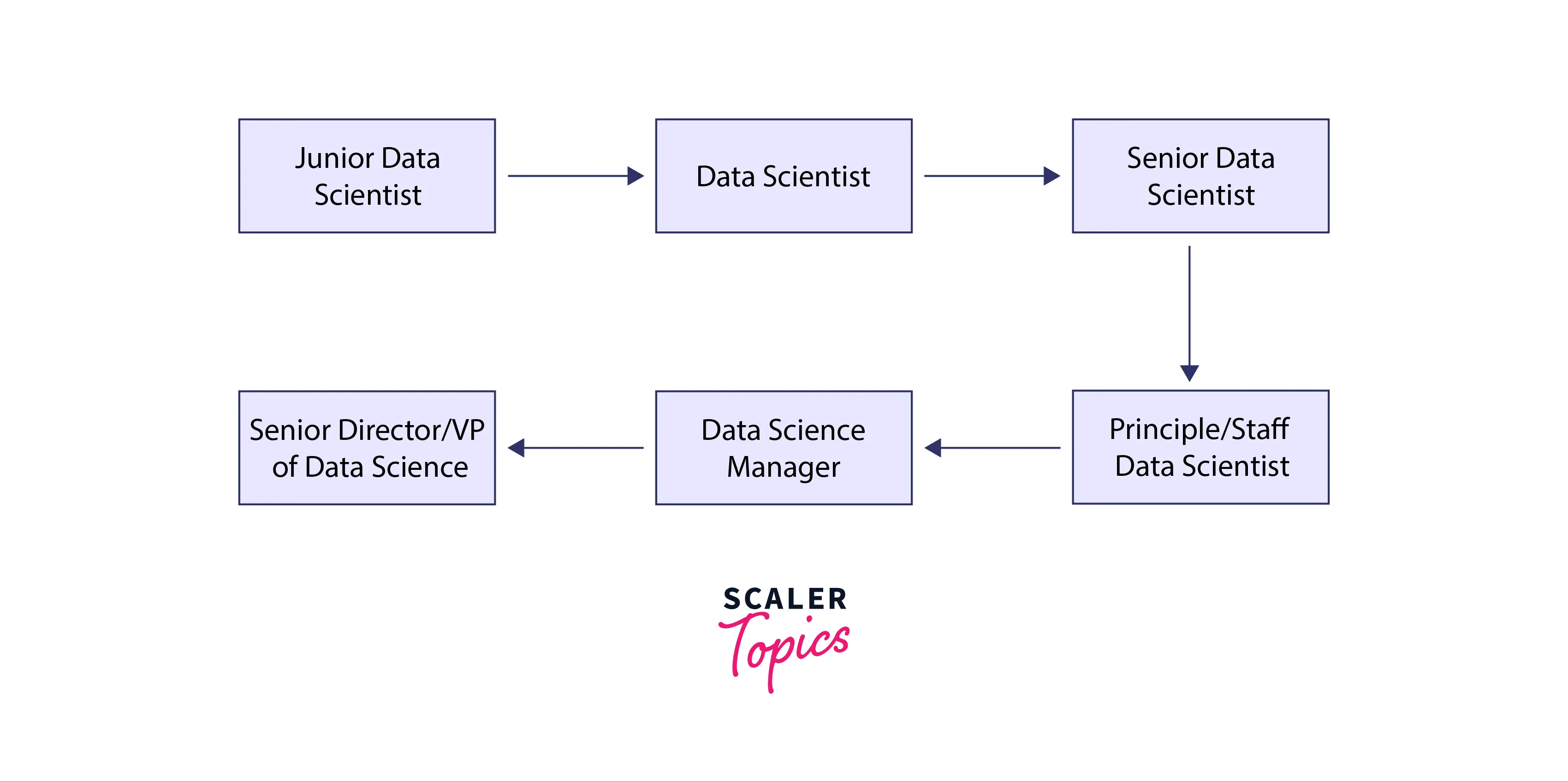Data Scientist Career Path

Introduction
Data Scientist: Person who is better at statistics than any software engineer and better at software engineering than any statistician. - Josh Wills
Currently, we are living in a world where data is the new oil, and analytics has become the combustion engine. Due to the advent of smartphones and digitalization, we are producing data at an unprecedented rate.
This rate will only be accelerated in the future due to the arrival of the Internet of Things (IoT). Organizations across industries have now understood the importance of processing this data for their success and growth and have started investing in implementing big data technologies that will make them data-driven in their day-to-day business processes. They are looking to hire data science professionals to leverage the data they store and derive valuable insights to drive business decisions.
Due to this, demand for data science professionals is expected to surge significantly in the next decade. The U.S. Bureau of Labor Statistics has estimated a 22 percent growth in data science jobs during , which is substantially higher than the 7.7 percent growth for other kinds of occupations.
Data Scientists who are practitioners of the data science discipline are one of the highest-paid professionals across the industries, and this job has already been regarded as the Sexiest Job of the 21st Century by Harvard Business Review (HBR).
As it is evident that Data Science offers a lucrative and promising career path for the next decade. In this article, we will discuss in detail the Data Scientist career path.
What is Data Science?
-
Data Science is the field of study to process the data stored in the organization’s repositories by applying various scientific methods.

-
It is a discipline that combines Statistics, Machine Learning, Computer Science, and their related methods to process the data and understand its underlying patterns. It includes collecting, cleaning, preparing the data, and identifying the patterns to derive insights that can help organizations become data-driven in decision-making for the growth and success of the company.
Who is a Data Scientist?
- Data Scientists are practitioners of the Data Science discipline who are responsible for solving various business problems by implementing data science techniques for an organization. Data Scientists are the ones who have the knowledge of Data Science but also understand the business world as well.
- They collect, process, and analyze large amounts of structured and unstructured data from a business point of view and apply various methods such as statistics, machine learning, etc. to create insights for organizations. They can be considered a combination of computer scientists and statisticians.
Prerequisites for Becoming a Data Scientist
To become a data scientist, there are several prerequisites that are typically required:
-
Strong foundation in math and statistics: Data scientist career path requires a solid understanding of probability, statistics, linear algebra, and calculus.
-
Proficiency in programming: You will need to be proficient in at least one programming language such as Python, R, or SQL.
-
Familiarity with data analysis tools: You will need to be familiar with data analysis tools such as pandas, NumPy, and scikit-learn.
-
Experience with data visualization: You should be proficient in data visualization tools like Tableau or Matplotlib.
-
Strong problem-solving skills: Data scientist career path must be able to take a complex problem and break it down into smaller parts.
-
Good communication skills: The ability to communicate complex data insights to non-technical stakeholders is essential.
-
Continuous learning: Data scientist career path is constantly evolving, so it's important to keep up-to-date with the latest tools and techniques.
Career Trajectory of a Data Science Professional
Data Science or Big Data Analytics is a relatively new sector that is still evolving. Still, there are many profiles in the Data Science sector where you can decide to position your career. All of these profiles require different sets of skills and have different responsibilities.
But all of them work toward a common goal which is making businesses data-driven in their decision-making process by implementing big data solutions. Some of the prominent examples of these profiles are Data Scientist, Data Engineer, Data Analyst, Business Intelligence Developer, etc.
In the case of Data Scientists, it was difficult to trace career trajectories a few years back as the sector wasn’t evolved enough, and many professionals started their careers in this field with years of experience in software engineering or statistics.
However, things are changing now, and we can find Data Scientist career path. In this field, you can start your career with an entry-level data scientist job such as Junior Data Scientist, and once you gain enough experience and sharpen your skills, you can become a Senior Data Scientist or Data Science Manager as well. Check out the interview guide containing the latest interview questions on Data Science to help you build a career in it.
Overall this field offers many opportunities to transition into technical or managerial roles based on your interests and skills. In the next section, we will discuss the data scientist career path in detail.

Data Scientist Career Path
In this section, we will discuss what different roles you will encounter on a Data Scientist’s career path, along with the skills required, responsibilities, etc.

Junior Data Scientist
- It is an entry-level data science role mostly suitable for fresh graduates or professionals having minimal experience in this sector.
- In this role, you will be tasked with basic data science jobs such as deriving insights using data collection from various databases, data mining or analysis, building a predictive or prescriptive model using programming languages such as Python or R, etc.
- To build a career in this role, you should understand statistics, machine algorithms, and programming languages.
| Parameters | Description |
| Year of Experience Required | 0- 2 years |
| Role Type | Individual Contributor (IC) |
| Jobs Responsibilities | Data Cleaning, Data Processing, Building Predictive or Prescriptive Models, Data Visualization |
| Skills Required | Statistics, Programming Languages, SQL, Machine Learning, etc. |
| Salary | Average salary of 7 lacs per annum |
Data Scientist
- It is the next level for a Junior Data Scientist where years of prior experience in the Data Science sector is required.
- In this role, you will be responsible for advanced data science tasks such as understanding business requirements, identifying relevant data sources, data cleaning and preparation, developing a predictive or prescriptive model using programming languages such as Python or R, etc, and communicating findings and recommendations to the stakeholders.
- For this role, you should have a sound understanding of statistics, machine learning algorithms, and programming languages along with good communications skills.
| Parameters | Description |
| Year of Experience Required | 1- 3 years |
| Role Type | Individual Contributor (IC) |
| Jobs Responsibilities | Business problem formulation, Data cleaning, Feature Engineering, Building Predictive or Prescriptive Models, Data Visualization, Communicating Results |
| Skills Required | Statistics, Programming Languages, SQL, Machine Learning, Communications Skills, etc. |
| Salary | Average salary of 12 lacs per annum |
Senior Data Scientist
- It is a senior role requiring at least years of experience in implementing Data Science solutions.
- In this role, you should be able to understand business problems and translate them into data solutions, work with messy or unstructured data, and derive insights from it by applying a wide variety of Machine Learning or Deep Learning techniques. You would also be required to drive and lead various data science initiatives within the organizations. You must be familiar with Big Data Processing frameworks such as Hadoop, Spark, etc. as you may also be tasked with building and maintaining machine learning pipelines. Overall in this role, you will own and drive the entire life cycle of a data science solution.
- For this role, you should have an in-depth understanding of statistics, machine learning, deep learning algorithms, big data frameworks, and programming languages, along with business acumen and strong communications skills.
| Parameters | Description |
| Year of Experience Required | 4- 5 years |
| Role Type | Individual Contributor (IC) |
| Jobs Responsibilities | Leading Data Science initiatives, processing large amounts of structured and unstructured data, building and maintaining ETL pipelines, developing complex predictive or prescriptive models, production deployment of the models, communicating findings and recommendations |
| Skills Required | In-depth understanding of Statistics, Programming Languages, SQL, Machine Learning, Strong Communications Skills, etc. |
| Salary | Average salary of 20 lacs per annum |
Principal/Staff Data Scientist
- It is a very senior role requiring at least years of experience required in leading various Data Science projects.
- In this role, you would be responsible for devising and leading data science strategy within the organization. You must have strong business acumen skills that can turn vague business problems into data science solutions or identify unknown business problems by performing open-ended data exploration. You would frequently work with senior business management to understand business pain points and communicate insights and recommendations.
You may also be required to publish research papers and patents for the organizations. You must have experience in delivering diverse data science solutions with strong business impact. As a Principal Data Scientist, you also need to mentor other data scientists.
- For this role, you should have an in-depth understanding of statistics, machine learning and deep learning algorithms, big data frameworks, and advanced programming languages along with strong business acumen, data intuition, and communications skills.
| Parameters | Description |
| Year of Experience Required | 5- 10 years |
| Role Type | Individual Contributor (IC) |
| Jobs Responsibilities | Identify unknown business problems, design data science strategy, lead data science initiatives, drive publications and patent tracks, provide mentorship |
| Skills Required | In-depth understanding of Statistics, Programming Languages, SQL, Machine Learning, Deep Learning, etc., and strong business acumen, data intuition, communications skills, etc. |
| Salary | Average salary of 30 lacs per annum |
Data Science Manager
- It is a managerial role requiring at least years of experience in implementing various Data Science solutions.
- In this role, you would be tasked to lead a team of Junior or Senior Data Scientists to own and manage the implementation of data science solutions for an organization.
You must have a broad knowledge of the Data Science field, including Big Data technologies and frameworks such as Hadoop, Spark, etc. You would be required to collaborate with multiple teams to collect their requirements and deliver data science solutions.
- For this role, you should have strong leadership skills along with a sound understanding of statistics, machine learning and deep learning algorithms, and big data frameworks. You also must have strong interpersonal skills such as business acumen, collaboration, and communication skills.
| Parameters | Description |
| Year of Experience Required | 5- 10 years |
| Role Type | Managerial |
| Jobs Responsibilities | Lead a team of Data Scientists, drive and deliver data science solutions, collaborate with multiple stakeholders |
| Skills Required | Leadership skills, a sound understanding of Statistics, Machine Learning, Deep Learning, etc., and strong interpersonal skills such as business acumen, collaboration, communications skills, etc. |
| Salary | Average salary of 28 lacs per annum |
Senior Director/VP of Data Science
- It is a leadership role requiring at least years of experience in leading various Data Science projects with strong business impact, preferably in multiple industries.
- In this role, you would lead a team of Principal Data Scientists, Data Engineers, Data Science Managers, and other data science professionals. You would work with senior management and other partner team head and will be responsible for implementing big data technologies and complex data science solutions based on larger business requirements and integrating them into products and business processes.
- For this role, you should have strong leadership skills and broad knowledge of Data Science and Big Data frameworks. You must also have very strong interpersonal skills such as business acumen, collaboration, and communications skills.
| Parameters | Description |
| Year of Experience Required | 10- 15 years |
| Role Type | Managerial, Leadership |
| Jobs Responsibilities | Head Data Science Team, Collaborate with senior management and other partner teams, Deliver data science solutions with strong business impact |
| Skills Required | Leadership skills, broad knowledge of Data Science as well as Big Data frameworks, and strong interpersonal skills such as business acumen, collaboration, communications skills, etc. |
| Salary | Average salary of 50 lacs per annum |
Eager to Explore Further in the Data Science Domain? Checkout Our Flagship Data Science Course and Master Data Science from Industry experts.
Other Related Career Options
In the Data Science sector, other than Data scientists, many prominent and in-demand profiles offer lucrative career paths. You can choose to build a career in these profiles based on your interests and skills.
Some of these prominent profiles are mentioned below:
Data Analyst
- Data Analysts typically deal with structured data to solve known or tangible business problems using various visualization tools, statistical analysis, and basic programming languages. They collect data to identify trends or monitor KPIs/metrics to help business managers understand and solve problems. For example, a Data Analyst can collect data and track a marketing campaign by creating dashboards showcasing KPIs/metrics which can help business leaders to improve their effectiveness.
Data Engineer
- Data Engineers are enablers for Data Scientists by providing them with transformed data that is easy for further analysis. A Data Engineer is responsible for developing data infrastructure and dealing with unformatted raw data that contains human or machine-generated errors. They design, build and develop ETL pipelines to prepare the data by formatting and cleaning it. They employ various big data technologies and advanced programming languages such as Java, Scala, Python, etc. to create these data pipelines.
Business Intelligence Developer
- A BI Developer is a software engineer that is responsible for building, deploying, and maintaining tools and technologies for Business Intelligence interfaces. It includes dashboards, data visualizations, data modeling tools, etc.
Future of Data Science
Data Science jobs are in high demand today across industries. CareerOneStop has predicted a 31 percent annual growth in Data Science jobs for the next decade. As organizations generate more and more data and with the arrival of the Internet of Things (IoT), they are looking for data science professionals to derive insights from this overwhelming amount of data by processing it.
In India, 96% of companies are looking to hire data professionals for their big data analytics division within one year. This ensures that the future of data science is very bright and offers promising career paths as well as high-salary jobs. Now is the time to upskill yourself if you wish to start your career in this field.
Conclusion
Now you have gained a firm understanding of various roles you will encounter in the Data Scientist career path, their responsibilities, and what skills are required to succeed in each role. A Data Scientist career path offers enough opportunities to move into technical or managerial roles based on your interests and experience.
It is important to stay tuned with ongoing research in this field to keep yourself relevant which will help you move into more senior roles. You must focus on the position above yours and look for opportunities to develop and sharpen your data scientist skills.
FAQs
Q: Is data scientist a good career?
Q: Yes, data scientist is a good career choice as there is a high demand for skilled professionals in this field due to the increasing importance of data in various industries. A career in data science offers intellectual stimulation, the opportunity to work with large datasets, and provides insights to help organizations make data-driven decisions. However, it requires a strong foundation in statistics, mathematics, and computer science, as well as experience with data analysis tools and programming languages like Python and R. It is also important to stay up-to-date with the latest developments in the field to remain competitive.
Q: How do I start a data science career path?**
A: To start a data science career, it's important to first develop a strong foundation in statistics, mathematics, and computer science through coursework, online tutorials, or self-study. Next, gaining practical experience with data analysis tools and programming languages such as Python and R is essential, and can be done through internships, online projects, or personal projects. Networking with other data scientists and attending industry events can also help to gain exposure to different industries and job opportunities. Additionally, obtaining a graduate degree in a related field such as data science, statistics, or computer science can be helpful in demonstrating knowledge and expertise to potential employers. Continuously updating skills and knowledge in emerging technologies and techniques is also important to remain competitive in the field.
Q: What is the next position after data scientist?**
A: The career path after data scientist varies depending on the industry, company, and individual's career goals. Some common next steps after working as a data scientist include roles such as data science manager, data science team lead, machine learning engineer, data architect, or even moving into more business-oriented roles such as product manager or director of analytics. These roles generally involve managing and leading teams, designing and implementing complex data systems, developing algorithms and models at scale, and driving the strategic direction of data-driven initiatives. Some data scientists may also choose to specialize in a specific area such as natural language processing, computer vision, or data ethics, and become experts in their field.
